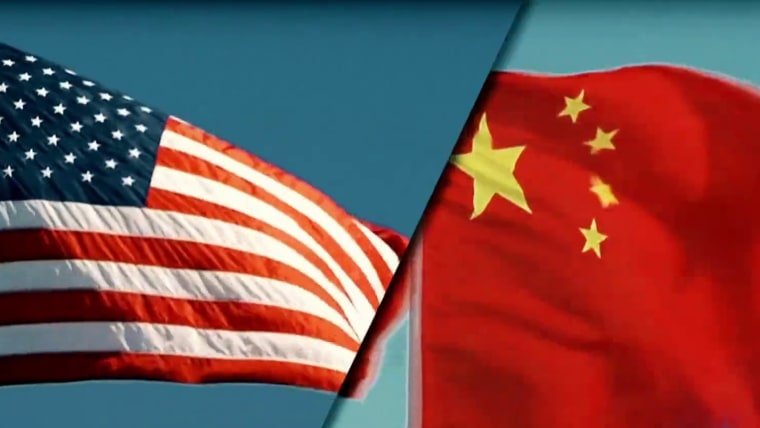Dan De Luce

China wants to avoid an escalation of tensions with the United States and believes it benefits from a more stable relationship with Washington, even as it seeks to bolster its global economic and military power, U.S. intelligence chief Avril Haines told lawmakers on Wednesday.
Despite recent sharp criticism of the U.S. by Chinese President Xi Jinping, “we assess that Beijing still believes it benefits most by preventing a spiraling of tensions and by preserving stability in its relationship with the United States,” Haines, director of national intelligence, told a hearing of the Senate Intelligence Committee.
China is increasingly challenging the United States, economically, technologically, politically and militarily around the world and “remains our unparalleled priority,” said Haines.
Haines and other intelligence officials appeared at the hearing as part of an annual assessment from the intelligence community on global threats facing the United States.
Xi’s speech this week at a Chinese Communist Party congress, in which he accused Washington of trying to prevent Beijing’s rise, likely “reflects growing pessimism in Beijing about China’s relationship with the United States” as well as worries about the trajectory of China’s domestic economic development and innovation challenges, Haines said.
Xi also wants “to message his populace and regional actors that the U.S. bears the responsibility for any coming increase in tensions,” Haines said.
The Chinese Communist Party “represents both the leading and most consequential threat to U.S. national security and leadership globally,” Haines said, adding that Beijing was “our most serious and consequential intelligence rival.”
U.S. officials and China experts have voiced concern about a lack of regular high-level dialogue between Beijing and Washington, saying a breakdown in communications raises the risk of an unintended collision or crisis.
The intelligence community’s latest report on global threats , which was released earlier Wednesday, said Chinese leaders would look to try to divide the U.S. and its allies but also reduce friction with the U.S. when it suited Beijing’s agenda.
“As Xi begins his third term as China’s leader, the CCP (Chinese Communist Party) will work to press Taiwan on unification, undercut U.S. influence, drive wedges between Washington and its partners, and foster some norms that favor its authoritarian system,” the report said. “At the same time, China’s leaders probably will seek opportunities to reduce tensions with Washington when they believe it suits their interests.”
To bolster its public image, China also is waging an increasingly “aggressive” campaign to influence U.S. opinion and policy makers, focusing on state and local officials who they believe “are more pliable than their federal counterparts,” the report said.
China has been laser-focused on achieving dominance in key technologies and the rivalry between Beijing and Washington will likely be shaped by which side was able to gain the upper hand in that technological competition, senators from both parties said at the hearing.
“While America was focused for two decades on counterterrorism, China was racing to overtake the U.S. in a range of emerging and foundational technologies such as advanced wireless communications, semiconductors, quantum, synthetic biology, next-generation energy, artificial intelligence, and in key upstream inputs like critical minerals,” said Sen. Mark Warner of Virginia, the Democratic chair of the Senate Intelligence Committee.
On Tuesday, Beijing’s new foreign minister said the U.S. and China are heading toward inevitable “confrontation and conflict” unless Washington changes course.
China has dismissed accusations from Washington that it’s considering providing lethal aid to Russia and charged the United States with stoking a potential conflict by selling fighter jets and other weapons to Taiwan.
Haines said there was “deepening collaboration” between China and Russia but did not say Beijing had made a decision to supply weapons and ammunition to Moscow.
China was “increasingly uncomfortable” about the non-lethal assistance it was providing Russia and appeared to be avoiding a high-profile public role, Haines said, without offering more details.
Asked by Sen. Angus King, I-Maine, about China possibly arming Russia, Haines said “that is a very real concern” and “how much assistance they’re providing is something we watch very carefully and we’d be happy to talk to you about that in closed session.”
Russian forces are suffering ammunition and personnel shortages and morale problems, and it was unlikely Russia would be able to capture large swathes of territory this year, Haines said. But Russian President Vladimir Putin appeared ready to press on with the war, betting that his forces could prevail over the long term, she said.
“We do not foresee the Russian military recovering enough this year to make major territorial gains, but Putin most likely calculates that time works in his favor, and that prolonging the war including with potential pauses in the fighting, may be his best remaining pathway to eventually securing Russian strategic interests in Ukraine, even if it takes years,” she said.
Haines also warned that the effects of climate change would aggravate risks to national security and intensify or trigger “domestic or cross-border geopolitical flashpoints.”
No comments:
Post a Comment